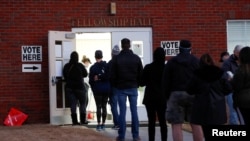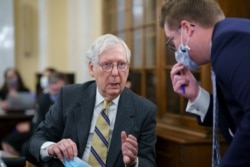Republican Mitch McConnell, the U.S. Senate minority leader, has taken a novel stance on freedom of expression, saying major corporations should continue writing hefty checks for political campaigns but at the same time keep quiet on controversial issues of the day.
McConnell, a longtime lawmaker from the mid-South state of Kentucky, assailed Major League Baseball, Coca-Cola and Delta Air Lines in recent days after they came out against a new law in the Southern state of Georgia that tightens voting restrictions. Democratic critics say the law will make it more difficult for Black voters to cast ballots in future elections.
But McConnell's stance could reverberate far beyond Georgia's borders.
Prominent national and regional companies, already significant funders of U.S. political campaigns, are trying to figure out their role in the public debate as Republican state lawmakers throughout the country look to change election laws they believe led to former President Donald Trump's loss in the November election to Democrat Joe Biden, now the country's 46th president.
Any response by business leaders could prove perilous for their financial interests, with some customers threatening to stop buying their products if they don't take a stand and others threatening boycotts if they do.
The soft drink maker Coca-Cola and Delta, a major airline, are both headquartered in Atlanta, Georgia's biggest city, while Major League Baseball pulled its annual All-Star Game from the city in protest of the new voting law.
McConnell has long championed expansive rights for corporations to make whatever donations they want to political campaigns, defending the largess as a form of free speech protected by the U.S. Constitution's First Amendment.
But when the companies castigated the voting law, McConnell rebuked them, accusing them of "bullying" politicians.
"My warning, if you will, to corporate America is to stay out of politics," McConnell said Tuesday. He also stressed that he was "not talking about political contributions," which corporations make to both Republicans and Democrats.
"It's not what you're designed for," McConnell told business leaders, referring to complaints about the Georgia law. "And don't be intimidated by the left into taking up causes that put you right in the middle of America's greatest political debates."
"Most of them contribute to both sides," McConnell said of corporations. "They have political action committees. That's fine. It's legal. It's appropriate. I support that. I'm talking about taking a position on a highly incendiary issue like (Georgia's) and punishing a community or state because you don't like a particular law they passed. I just think it's stupid."
Meanwhile, some Democrats applauded corporate complaints about the Georgia law, with Biden saying he thought baseball's decision to move the All-Star Game out of the state was appropriate.
"I think today's professional athletes are acting incredibly responsibly," Biden said in an interview with sports channel ESPN. "I would strongly support them doing that. People look to them. They're leaders."
Chief executives from more than 100 prominent companies recently issued a public statement strongly opposing any legislative measures designed to deny eligible voters the right to cast a ballot. The companies — part of a coalition called Civic Alliance, said, "We believe every American should have a voice in our democracy and that voting should be safe and accessible to all voters."
In a statement, McConnell said, "From election law to environmentalism to radical social agendas to the Second Amendment (protecting gun ownership), parts of the private sector keep dabbling in behaving like a woke parallel government. Corporations will invite serious consequences if they become a vehicle for far-left mobs to hijack our country from outside the constitutional order."
On Wednesday, McConnell retreated somewhat from his complaint about corporate opposition to the Georgia law.
"I didn't say that very artfully yesterday," McConnell said. "They certainly are entitled to be in politics. ... My complaint about the CEOs is they ought to read the damn bill," referring to the Georgia law.
When the U.S. Supreme Court ruled in 2010 that companies could finance election spending, McConnell applauded the decision, saying, "For too long, some in this country have been deprived of full participation in the political process." He said the ruling was "an important step" in "restoring the First Amendment rights of these groups."
Republican lawmakers in at least 40 states are considering laws that opposition Democrats say will make it more difficult for people of color to vote. Black voters especially helped Biden defeat Trump.
American Airlines is criticizing a proposal in the southwestern state of Texas that would prohibit extended voting hours and ban drive-through voting.
Republican state legislators are arguing that by limiting early voting and absentee balloting and requiring more secure identification to vote, election fraud will be curbed, although there were only minor irregularities reported in the 2020 voting.
The Republican state lawmakers have taken their cue from Trump, who continues to falsely state he was cheated out of reelection despite lack of evidence for his claims and even though judges across the country dismissed his legal challenges to the election outcome.





